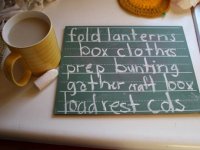Cheat Sheet for the First Days of School
Your content has been saved!
Go to My Saved Content.For those of us in the field of educating young minds, we often find that summer does two things rather well. First, it helps us remember a time when our first names weren't Mister or Miss for the majority of the day and when we didn't have to break out into a vibrant soliloquy whenever the tenor of a room didn't feel right. Secondly, it abruptly breaks us out of our own routines for how we go about our days. We don't follow the bells or the crowds swooshing past the hallways to their next stations.
All this is wonderful and divine until the start of the school year, when we need to realign ourselves with the rhythm of a regular school day. As the bulletin boards go up and the chalkboards, whiteboards and Smartboards get dusted and polished for another intense school year, some of the newer teachers (at one point, this was me, too) scramble to remind themselves of the tone they need to set in the classroom, and how their own routines will often mirror students' routines.
Any good teacher knows that we all have shortcuts, a handy set of things we need to remember before we develop the other, more elaborate parts of our routine.
1) Develop an easy slogan for expectations in your classroom.
Having a slogan that everyone can remember will remind kids of the rules you clearly set in the beginning of the school year. Few of us (teachers included) look up at the rules and cite them in our punishment. Most teachers have a general guideline of behaviors that we expect and pull up quickly when a student has crossed a certain line. For instance, my slogan is usually founded on respect: i.e., "Respect yourself, respect me and respect each other." Most of the rules we live by in the classroom follow in more detail. I rarely have to look up at the rules, because the kids remember the word "respect" and, for that matter, "disrespectful."
2) Be very transparent about the way you grade your classes.
Especially during the first semester, children should expect to get an appropriate grade for their efforts and proficiency. Having all the expectations set on the first day of class is only half the battle; the other is assuring that you keep the "it's not fair!" to a minimum. I understand that educators use a bit of subjectivity in their grades, too, depending on actual class participation, but even that requires lots of discussion with each student and the entire class. I have found using an electronic grading system like EnGrade helpful in that grades will update in real time, so students and parents can check on academic progress.
3) Schedule a time to reflect on your practice and stick to it.
Reflection is similar to exercise: if you don't do it frequently enough, you're likely to feel heavier. With the advent of the Internet, educators now have even more ways of taking their reflections to another level. I know that, for myself, I get a chance to reflect on my blog once a week, honing in on either a particular student or a practice I used that may have worked. Others take to Twitter or Facebook to join communities of teachers that help each other troubleshoot issues or provide sympathetic ears for stories of their own classrooms.
I also like to reflect right after I've given a test, sifting through some of the common errors and successes. Maybe, instead of staring at the doodles one of my creative kids left on the back of their exam, I'll draw my own with a big “Welcome back.” That'll start things off well.
